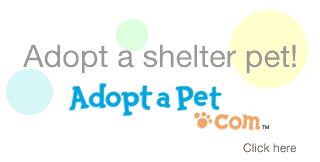Here's a great article that I thought I would pass on...hope you find it interesting! –Kim
The Myth of the Humane Society of the United States
Feb. 4, 2010
By: John Dillard University of Richmond Law School
 I recently viewed a commercial for the Humane Society of the United States (HSUS). It contained footage of pets suffering from abuse. The footage of dirty cats with split ears to dogs visibly suffering from neglect and malnourishment was intended to tug at the heartstrings of anyone with half a heart. In addition to the animal footage, the commercial featured the lady from Just Shoot Me asking the viewers to commit to a $19 monthly pledge to help save these animals from abuse and neglect. The funds raised by the ad campaign would ostensibly be used to fund animal rescue efforts and animal adoption services.
I recently viewed a commercial for the Humane Society of the United States (HSUS). It contained footage of pets suffering from abuse. The footage of dirty cats with split ears to dogs visibly suffering from neglect and malnourishment was intended to tug at the heartstrings of anyone with half a heart. In addition to the animal footage, the commercial featured the lady from Just Shoot Me asking the viewers to commit to a $19 monthly pledge to help save these animals from abuse and neglect. The funds raised by the ad campaign would ostensibly be used to fund animal rescue efforts and animal adoption services.
For less than a dollar a day, it seems like a common sense move for a pet lover with disposable income to contribute to the HSUS. Who doesn't like the idea of an organization dedicated to rescuing animals from neglect?
There is one minor detail left out of these commercials. The Humane Society of the United States is not a large network of animal shelters, as it would have you to believe. In fact, the HSUS does not own, operate, or lease a single animal shelter in our country. Instead, it is primarily a special interest lobby that is clever and shrewd enough to capitalize on the good name of local "humane societies" which actually do the good work of taking in strays and finding suitable adoptive homes for unwanted pets.
 While most local animal shelters scrimp and scrape to collect enough funds to cover overhead, the HSUS has a healthy budget of well over $100 million. According to their most recent annual report (2008), $6.7 million, or 5.4% of their $125 million budget was spent on animal shelters. The bulk of the balance was spent on fundraising, campaigns, lawsuits, propaganda, and those people that stand outside the D.C. Metro who stop you and ask "Do you have a minute to talk about saving animals?"
While most local animal shelters scrimp and scrape to collect enough funds to cover overhead, the HSUS has a healthy budget of well over $100 million. According to their most recent annual report (2008), $6.7 million, or 5.4% of their $125 million budget was spent on animal shelters. The bulk of the balance was spent on fundraising, campaigns, lawsuits, propaganda, and those people that stand outside the D.C. Metro who stop you and ask "Do you have a minute to talk about saving animals?"
2008 HSUS Expenditures Deception notwithstanding, the HSUS has cornered the market on the animal rights movement. It has wrestled the lead in the animal rights world from PETA and does not appear likely to give it back. PETA is highly visible, yet it is destined for the fringe due to its radical approach. Throwing red paint on fur coats or having B-list bombshells pose nude save a few leaves of lettuce is sure to garner attention, but it is not enough to open the hearts and wallets of middle America. To be sure, HSUS shares the same goals as PETA, namely the eradication of animal agriculture in the United States. However, HSUS learned valuable lessons from PETA's radical approach, thus we have the lady from Just Shoot Me pleading for donations.
The HSUS' calculated approach is largely successful. Unable to gain traction in state legislatures and Congress, it has taken to ballot measures and referendums. This method of legislation suits their mass-appeal approach much better than lobbying legislators who must analyze facts and balance the interests of their constituents. HSUS can frame the issue and develop a campaign that gives the casual voter an impression that voting "Yes" on a ballot initiative is the right thing to do. This was the case with California 2008's Proposition 2.
Proposition 2, widely overshadowed by Proposition 8, was a ballot initiative that would impact animal husbandry practices for swine, poultry and dairy farms, with most of the burden resting on egg layers and pork producers. HSUS poured millions into PR for the ballot initiative and attracted the support of all manners of celebrity, including a special on Ellen. The measure passed with 63% of the vote and will take effect in 2015. HSUS declared it a resounding victory and vows to move on to the next battle.
 Herein lies the problem with the HSUS. As a national lobbying organization with a large war chest, they are able to successfully lobby for mandated changes in animal rearing practices from afar. After their victory, they can pop the champagne and move on to the next adventure. Meanwhile, their targets are left to deal with the consequences. The majority of California egg and pork producers will not change how they raise their animals as a result of Prop 2. Instead, they will cease to raise animals as a result of Prop. 2. California farmers will have to scramble to pay down the millions in debt they owe on expensive, sophisticated and safe housing for animals they will not be able to raise after 2015. California consumers will pay more to have pork and eggs hauled in, increasing the food miles of their breakfast and moving their food dollars further away from their community.
Herein lies the problem with the HSUS. As a national lobbying organization with a large war chest, they are able to successfully lobby for mandated changes in animal rearing practices from afar. After their victory, they can pop the champagne and move on to the next adventure. Meanwhile, their targets are left to deal with the consequences. The majority of California egg and pork producers will not change how they raise their animals as a result of Prop 2. Instead, they will cease to raise animals as a result of Prop. 2. California farmers will have to scramble to pay down the millions in debt they owe on expensive, sophisticated and safe housing for animals they will not be able to raise after 2015. California consumers will pay more to have pork and eggs hauled in, increasing the food miles of their breakfast and moving their food dollars further away from their community.
Perhaps, if the Humane Society of the United States used its resources towards the animal shelters it would like you to believe it operates in the communities it seeks to regulate by fiat, there would be a more collaborative and productive dialogue on issues of animal welfare.
Source: http://petpac.net/news/headlines/the_myth_of_the_humane_society_of_the_united_states/
© 2010 PetPAC
Also, see:
- HSUS Isn't a Pet Shelter
- National Pet Owners Bill of Rights
- HSUS/PETA: Same Hidden Agenda
- More Waste in the Name of "Animal Rights"
- "Animal Rights" Extremists Quote Al Capone
- The HumaneWatch HSUS 50% Pledge
- Animal Welfare vs. Animal Rights




































